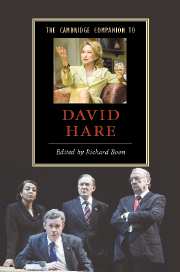9 - Directing Hare
from Part II - Working with Hare
Published online by Cambridge University Press: 28 April 2008
Summary
Paul Scofield once wrote this to a friend of mine who'd had been rash enough to write to ask him to give a lecture on the subject of acting. 'I have found that an actor's work has life and interest only in its execution', he said; 'It seems to wither away in discussion, and become emptily theoretical and insubstantial.' If discussing acting is difficult - 'writing on water', Garrick called it - imagine the folly of trying to describe directing, an activity of which audiences are largely unaware unless it's intrusively self-advertising, and which even its practitioners find hard to define and harder still to describe. It's something you do, like gardening, and, like gardening, you only learn about it by doing it.
Directing is the process of understanding the meaning of a play and staging it in the light of that knowledge, underscored by a view of what the writer is trying to say and why. In the case of a play by David Hare the ‘why’ is as important as the ‘what’ – the politics and attitudes to class and gender are seamlessly woven into the writing. But even the most innocent of comedies reflects a view of the world that a director endorses or indicts by his or her choices in casting, design, costume and performances: they demonstrate a view about how people live, how they behave and how they are influenced. What do the characters earn? Where were they were born? What do they believe in? Answering these questions is central to deciding how a director physicalises the world of a play and how the actors speak and move and dress.
- Type
- Chapter
- Information
- The Cambridge Companion to David Hare , pp. 138 - 150Publisher: Cambridge University PressPrint publication year: 2007



